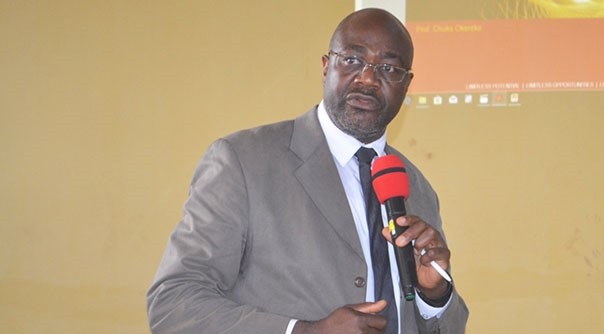The Centre for Climate Change and Development Alex Ekwueme Federal University, Ndufu Alike Ikwo (CCCD AE-FUNAI), Ebonyi State, has published several reports that are related to the revision of the Nigeria Nationally Determined Contributions (NDCs).

The reports, which are outputs from the ongoing project by the Centre titled “Promoting Public Engagement with Nigerian NDC Revision and Climate Action” in collaboration with the World Resources Institute (WRI), covered the following topics:
- Analysis of the Adaptation components that could be included in Nigeria’s revised NDCs.
- Options for promoting climate-smart Agriculture in the new NDCs in Nigeria.
- An assessment of Nigeria’s implementation of its original nationally determined contributions (NDCs) and implementations for the revised version.
- Energy scenarios for Nigerians nationally determined contributions (NDCs) revision
- Strengthening the role of the private sector in meeting Nigeria’s NDCs targets.
- Legal perspectives to raising ambition and implementing the nationally determined contributions (NDCs) in Nigeria.
The reports were commissioned to increase public awareness of, and engagement with, Nigeria’s climate change plan to help in the ongoing revision process of Nigeria NDCs, which will be due for submission later this year (2021).
The report on Analysis of the Adaptation Components that could be included in Nigeria’s Revised NDCs shows that a review of the adaptation section of Nigeria’s NDC indicates that the range of sectors it includes as climate priorities are narrow, according to the director of CCCD AE-FUNAI, Prof Chukwumerije Okereke.
According to him, yhey do not cover enough sectors that could upscale the ability of the country to adapt to the adverse impacts of climate change and foster climate resilience and low greenhouse gas emissions development sustainably.
The report on Options for promoting Climate-smart Agriculture in the new NDCs in Nigeria explained that the new NDC must be ambitious and comprehensive and contribute to the global goal of limiting temperature rise to below 2degrees Celsius (20C). Nigeria’s agriculture, forestry, and other land-use sectors play a prominent role in its economic development and food security.
Prof Okereke noted that the sector is highly vulnerable to climate change due to insignificant dependence on rain-fed conditions and is dominated by smallholder farmers with limited adaptive capacity.
On the Assessment of Nigeria’s implementation of its original NDCs and implications for the revised version, the scholars argued that the Paris Agreement and the NDC tools remain a turning point in the country’s efforts to achieve mitigation and reach adaptation milestones to curb the monster called climate change.
They stressed that a detailed and result oriented delivery of activities in the NDC implementation index for Nigeria and the consequent monitoring and tracking of efforts would go a long way towards positioning the country on the path towards a low-carbon and resourceful-efficient trajectory.
The report on Energy Scenario for Nigerian’s NDCs Revisions listed the various gaps in the existing NDCs to include: circumvention subsisting energy-related policies, lumped energy efficiency pathways, over-concentration on solar PV, neglect of the residential sector, neglect of advanced emissions control technology, and neglect off-grid renewable energy utilisation.
In the paper on Strengthening the Role of the Private Sector in meeting Nigeria’s NDCs targets, the authors said that the awareness about the Paris Agreement, climate change, and the NDC is still low. They identified some of the factors responsible for the poor participation of the sector in Nigeria’s NDC to include the low capacity to transform NDCs implementation plans into investment-ready projects, low support to create pilot projects that demonstrate new investment schemes to accelerate adaptation and mitigation actions, low awareness of the Paris Agreement, climate change and NDC – a significant barrier to moving forward with concrete climate action, low capacities to develop appropriate financial proposals or requests for funding assistance from different sources and the specific sectors identified in the NDC.
Also inclusive is a lack of a supportive investment environment with clear and transparent regulations and well-designed policy incentives for the private sector to contribute to financing climate actions. This is said to have hampered the support to create pilot projects that demonstrate new investment schemes to accelerate adaptation and mitigation actions.
In the paper on Legal Perspective to raising ambition and implementing the Nationally Determined Contributions (NDCs) in Nigeria, the scholars noted that Nigeria currently does not have any legislation that directly addresses climate action in Nigeria. Although there are some legislative instruments with climate co-benefits, the main instrument guiding climate change action in Nigeria is a policy instrument that Nigeria climate change policy response and strategy (NCCPRS) adopted in 2012.
Addressing climate policies however important are not enforceable and cannot take the place of legislation, added the scholars, pointing out that the Climate Change Bill, 2019 has undergone the legislative process several times but has not received presidential assent and had therefore not been passed into law.
The reports were written by national and international experts and are intended to complement the revision of the NDCs that is being organised by the Federal Government.
Prof Okereke said he is delighted that the Centre has made a substantial contribution to the revision of the NDCs and hopes that the government and wider stakeholders will find these reports useful.
“Each of these reports focused on the critical sectors in the NDCs revision and the Paris Agreement which Nigeria is a party. The various topics were analysed and solutions proffered; if the government can utilise the solutions and suggestions of these erudite scholars it will help Nigeria to achieve its NDCs targets and meet up with the Paris Agreement.
“Many of these reports were subject to extensive stakeholder consultation and webinars held from last year (2020) to this year,” Okereke submitted.
The working papers can be downloaded here: https://cccd.funai.edu.ng/final-papers-from-the-ndc-project/
